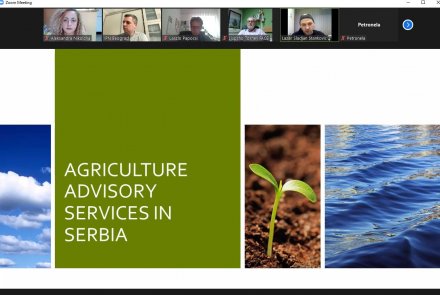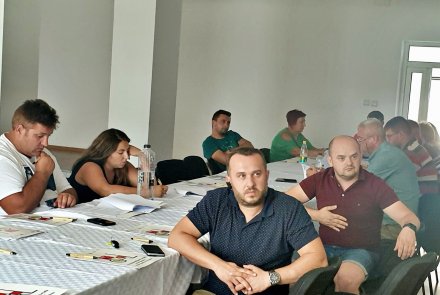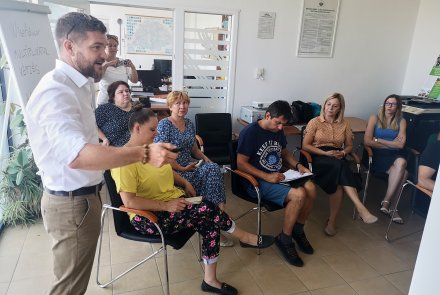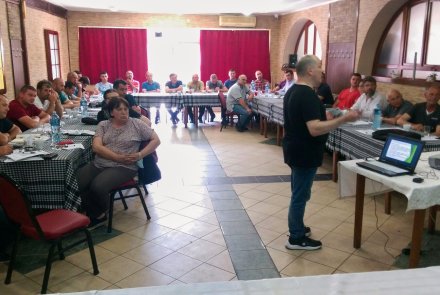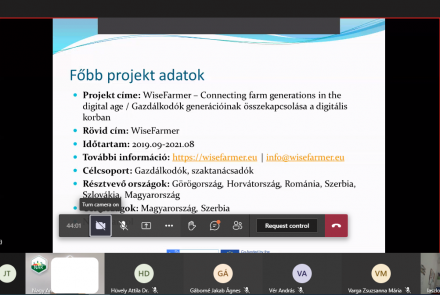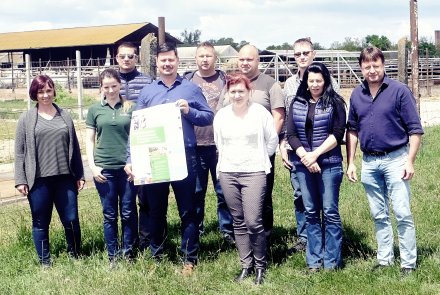Farmer interviews in Greece
Agricultural University of Athens-Greece, during OUTPUT 1 of the project, organized farmer interviews on 31st October - 1st November 2019. The Case study covered the area of Prefecture of Karditsa , in the ThessalΥ Region. The number of interviews was 7, with 4 young farmers-between 30 and 40 years old and 3 experienced – up to 60 years old.
According to the results, the average farm size: 40 acres (ranging from 25 to 100 acres). The interviewed farmers have always farmed in the same region.
They mainly produce: cotton, corn, wheat, clover, tobacco, peppers, stevia and peanuts. They are farming their fields themselves; some of them also provide machinery services to many smaller farms in the village.
The crops farmers cultivate (esp. cotton, corn, wheat, clover, tobacco) cover 90% of the cultivated lands of the area (a somehow tradition); therefore they have decided to cultivate these crops because they have the know-how.
Farmers do not believe that other farmers, similar to them, in the area make a good living from their activities.
They are not satisfied financially but, on the other hand, they claim that they like this job (farming) because they like to work and live in nature/the countryside and they are their own boss(es).
The majority of the farmers (4 out of 7) have already started something new and/or supplementary to agriculture; among them 2 of the young farmers are included while the other 2 young farmers have thought of it but have not taken action.
Before making a decision all of the respondents said that they consider the opinion of their extended family especially the experienced-older members (e.g. their dad, uncle, etc.). Sometimes they consult their accountant and/or local agronomists.
In their opinion their machinery and equipment are outdated (in 3 cases) or in working condition (in 2 cases). They would like to purchase new equipment but they have not due to affordability and farm size. It is important that only the younger farmers know of innovative machinery that utilize digital equipment/technologies.
The most referred to by the farmers problems are as follows: (a). irrigation (“when you do not have enough water you can’t do anything”), (b) plant diseases and pests, (c) weather conditions and (d) produces’ prices.
With regard to these issues/problems they think that usually agronomists, family and friends as well as discussions with various stakeholders can help; however they complain that especially stakeholders, such as public services, do not hear/pay attention to them.
Therefore, they usually they ask for and get help from different members of their extended family especially the experienced ones (dad, uncle) - or they get instructions from them, which is the same.
All of the interviewed farmers have regular or every day contacts with other farmers and their cooperation extends beyond the exchange of experience; but, only one young farmer has online communication with other colleagues on professional issues.
They usually get information about general issues from the internet and TV.
Five (5) out of seven (7) farmers use the internet (the 2 who do not use it are experienced ones) via PCs and smartphones, everywhere (home, road, etc.), every day - for about 2-3 hours on average - for information, communication and transactions (especially the last ones as related to bank transactions). In general, farmers believe that they can do everything they want on the internet and they assess their digital skills as medium. If they need help on internet then they ask younger members of their family.
As far as sources concerning information on business/farming issues are concerned they mostly refer to: (a) general resources (TV, radio, local newspapers, etc.); (b) professional magazines/press; (c) consultants/advisors/extensionists; and (d) demonstrations (organized by input companies). The training sessions are underlined as important sources as well and farmers claim that they attend when they have the opportunity.
It is also important to mention that only one young farmer is a member of a cooperative.
Among the five (5) out of seven (7) farmers who use Internet/ICT for farming purposes only two use farming support apps (for sprayer calibrator and productivity monitoring). One of the young farmers underlined the need for information about these kinds of tools while, on the contrary, an experienced farmer said that he can keep everything in his mind.
Two of the experienced farmers who do not use the internet said they have never tried to use it because they do not like it so much and due to the lack of skills. It seems that they are not interested and they get bored with it. One also underlined that he couldn't learn any more.
All the farmers who use the internet regularly are interested in WiseFarmer (5 out of 7, with the 6th saying that “he is not sure … but he might be”). One of them claimed that “perhaps there is nobody in the village who knows well how to use a PC; that is sure for the elder, only the young people may know…”. Another one stated that “exchanging knowledge is very useful but we need to be freed from state-bureaucracy for this to become true [in the sense that if freed from bureaucratic burdens then they will have time to devote to knowledge exchange and the like]”. Finally, an interviewee underlined that “even though the land-soil preparation is different between different local areas, from one to the other side of the village or in a distance of 2-3 km away from one’s filed, the exchanging knowledge is very important”.

